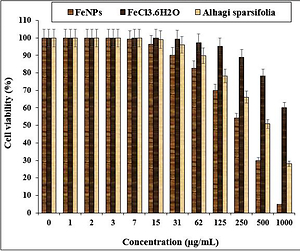Current issue
Archive
Manuscripts accepted
About the Journal
Editorial office
Editorial board
Section Editors
Abstracting and indexing
Subscription
Contact
Ethical standards and procedures
Most read articles
Instructions for authors
Article Processing Charge (APC)
Regulations of paying article processing charge (APC)
PHARMACOLOGY AND PHARMACY / BASIC RESEARCH
Biosynthesis of iron nanoparticles using Alhagi sparsifolia extract for treatment of colorectal carcinoma in in vitro conditions: a pre-clinical trial study
1
Department of Gastrointestinal Surgery, 3201 Hospital, Hanzhong, 723000, China, China
2
Department of Pediatrics, College of Medicine and King Khalid University Hospital, King Saud University, Riyadh, Saudi Arabia
3
Department of Botany and Microbiology, College of Science, King Saud University, Riyadh, Saudi Arabia
4
Department of Molecular Biology and Biotechnology, University of Sheffield, Sheffield, United Kingdom
Submission date: 2021-08-07
Final revision date: 2021-09-11
Acceptance date: 2021-10-12
Online publication date: 2021-10-22
Corresponding author
KEYWORDS
iron nanoparticlesgreen synthesischemotherapeutic druganti-human colorectal carcinomaantioxidantcytotoxicity
TOPICS
ABSTRACT
Introduction:
Every year, many people die due to cancer all over the world. So, the development of effective new chemotherapeutic supplements and drugs for the treatment of cancer is a priority for both developing and developed countries. Recently, iron nanoparticles (FeNPs) have been used as modern chemotherapeutic drugs for the treatment of several cancers such as leukemia, lung cancer, breast cancer, and prostate cancer.
Material and methods:
In the present study, iron nanoparticles were green-synthesized using an aqueous extract of Alhagi sparsifolia leaf. The synthesized FeNPs were characterized by analytical techniques including SEM, TEM, UV-Vis, and FT-IR.
Results:
The nanoparticles were formed in a spherical shape in the average size of 47.24 nm. In the antioxidant test, the IC50 values of FeNPs and BHT against DPPH free radicals were 161 and 134 µg/ml, respectively. The anti-human colorectal carcinoma activity of FeNPs was evaluated using MTT assay. In the cellular and molecular part of the recent study, the cells treated with FeNPs were assessed by MTT assay for 48 h about the cytotoxicity and anti-human colorectal carcinoma properties on normal (HUVEC) and colorectal carcinoma cell lines, i.e. HT-29, HCT 116, HCT-8, and Ramos.2G6.4C10. The viability of the malignant colorectal cell line decreased dose-dependently in the presence of FeNPs. The IC50 of FeNPs were 250, 293, 276, and 344 µg/ml against HT-29, HCT 116, HCT-8, and Ramos.2G6.4C10 cell lines, respectively.
Conclusions:
After clinical study, iron nanoparticles containing Alhagi sparsifolia leaf aqueous extract may be used to formulate a new chemotherapeutic drug or supplement to treat the several types of human colorectal carcinoma.
Every year, many people die due to cancer all over the world. So, the development of effective new chemotherapeutic supplements and drugs for the treatment of cancer is a priority for both developing and developed countries. Recently, iron nanoparticles (FeNPs) have been used as modern chemotherapeutic drugs for the treatment of several cancers such as leukemia, lung cancer, breast cancer, and prostate cancer.
Material and methods:
In the present study, iron nanoparticles were green-synthesized using an aqueous extract of Alhagi sparsifolia leaf. The synthesized FeNPs were characterized by analytical techniques including SEM, TEM, UV-Vis, and FT-IR.
Results:
The nanoparticles were formed in a spherical shape in the average size of 47.24 nm. In the antioxidant test, the IC50 values of FeNPs and BHT against DPPH free radicals were 161 and 134 µg/ml, respectively. The anti-human colorectal carcinoma activity of FeNPs was evaluated using MTT assay. In the cellular and molecular part of the recent study, the cells treated with FeNPs were assessed by MTT assay for 48 h about the cytotoxicity and anti-human colorectal carcinoma properties on normal (HUVEC) and colorectal carcinoma cell lines, i.e. HT-29, HCT 116, HCT-8, and Ramos.2G6.4C10. The viability of the malignant colorectal cell line decreased dose-dependently in the presence of FeNPs. The IC50 of FeNPs were 250, 293, 276, and 344 µg/ml against HT-29, HCT 116, HCT-8, and Ramos.2G6.4C10 cell lines, respectively.
Conclusions:
After clinical study, iron nanoparticles containing Alhagi sparsifolia leaf aqueous extract may be used to formulate a new chemotherapeutic drug or supplement to treat the several types of human colorectal carcinoma.
Share
RELATED ARTICLE
We process personal data collected when visiting the website. The function of obtaining information about users and their behavior is carried out by voluntarily entered information in forms and saving cookies in end devices. Data, including cookies, are used to provide services, improve the user experience and to analyze the traffic in accordance with the Privacy policy. Data are also collected and processed by Google Analytics tool (more).
You can change cookies settings in your browser. Restricted use of cookies in the browser configuration may affect some functionalities of the website.
You can change cookies settings in your browser. Restricted use of cookies in the browser configuration may affect some functionalities of the website.



